Resharing this article on Valentine’s Day – 7 years later!
600 Likes received on this post
Due to a non-functioning plugin, the FB Likes disappeared 🙁 – if you like the post you can re-start the Likes all over again!Have a brand-new Like button installed!
27502 people reached on Lassi with Lavina FB page 51 shares.
2100 Likes on Huffington Post 102 shares.
Yasmen Mehta, Lisa VeneKlasen and 103 Like it on Lassi with Lavina FB page
Gay Rights in India Group – 1000 Likes 292 Shares and 129 Comments
Facebook Indian LGBTQA Group 61 Likes 3 Shares
This article first ran in 2015
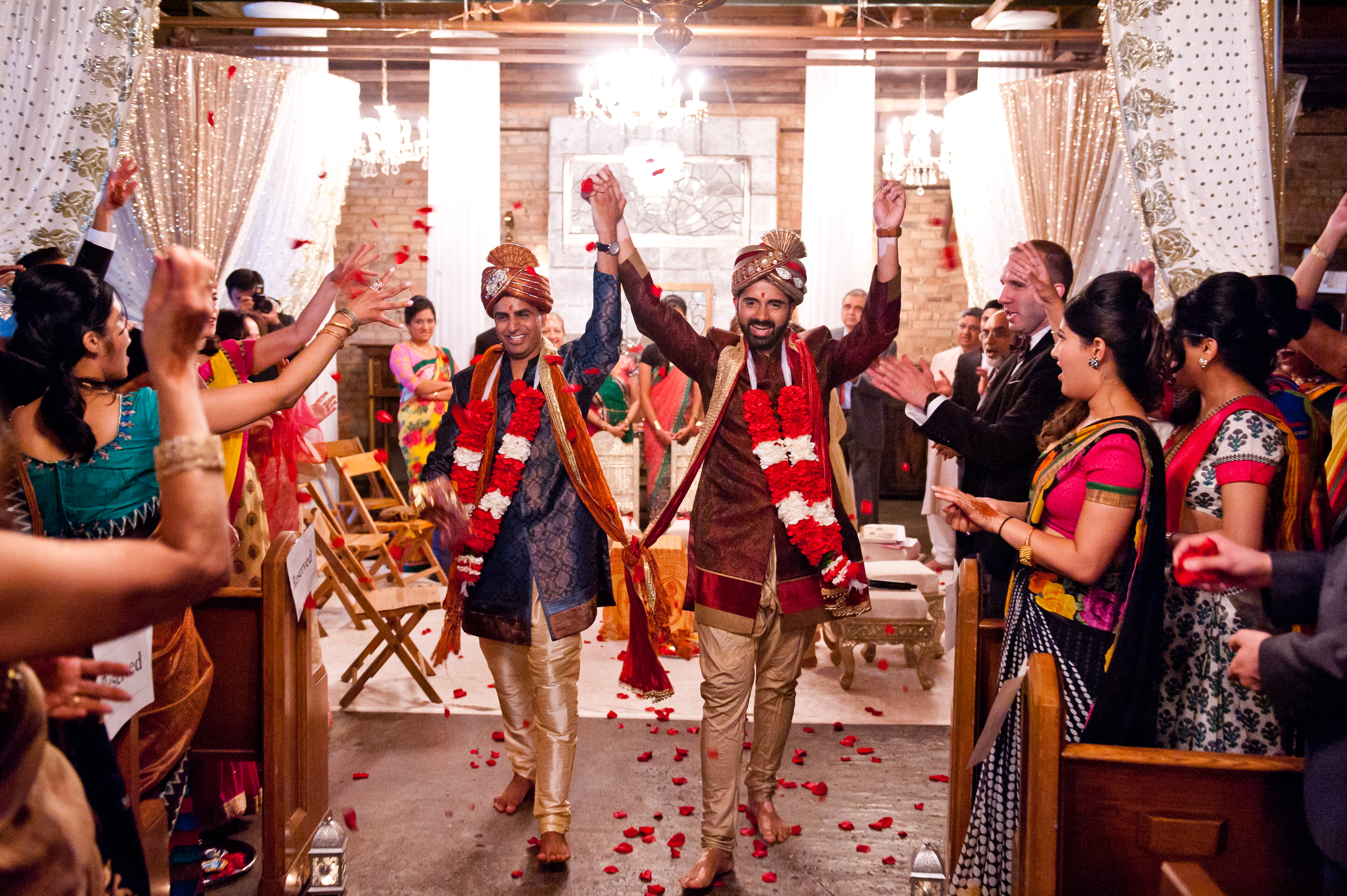
#Gaypride
Love is Love is Love is Love is Love
Celebrating the Marriage of Neeral Sheth and Anu Hazra
[dropcap]I[/dropcap]t was a small, factual announcement in the wedding pages of The New York Times about the wedding of Dr. Aniruddhah Hazra and Dr. Neeral Kamlesh Sheth in Chicago. The photo showed two smiling happy men with the smiles reaching their eyes. Before we really got to enjoy this rare love story with a happy ending, other larger, grimmer world events occurred which overshadowed this news.
Orlando happened.
In a nightmare scenario in that Disney paradise, a homophobic ISIS supporter entered Pulse, the gay nightclub, and gunned down 49 people and injured at least 53. This heartbreaking story of extinguished lives and meaningless loss dominated the news and the hearts of rational and fair-minded people everywhere. This shocking, largest ever incident of gun violence in the history of the United States moved the Democrats in the US House of Representatives to stage a historic sit-in led by Rep. John Lewis, a hero of the Civil Rights movement. Asked Lewis: “Do we have the courage, do we have the raw courage to make at least a down payment on ending gun violence in America?”
Orlando is just the latest of so many challenges in our race and gender-biased, homophobic world. Yet the wonderful love story of Neeral and Anu does celebrate the way our world is slowly changing – and for the better. A decade ago this very public declaration of same-sex commitment and the legalization of it would have been impossible.
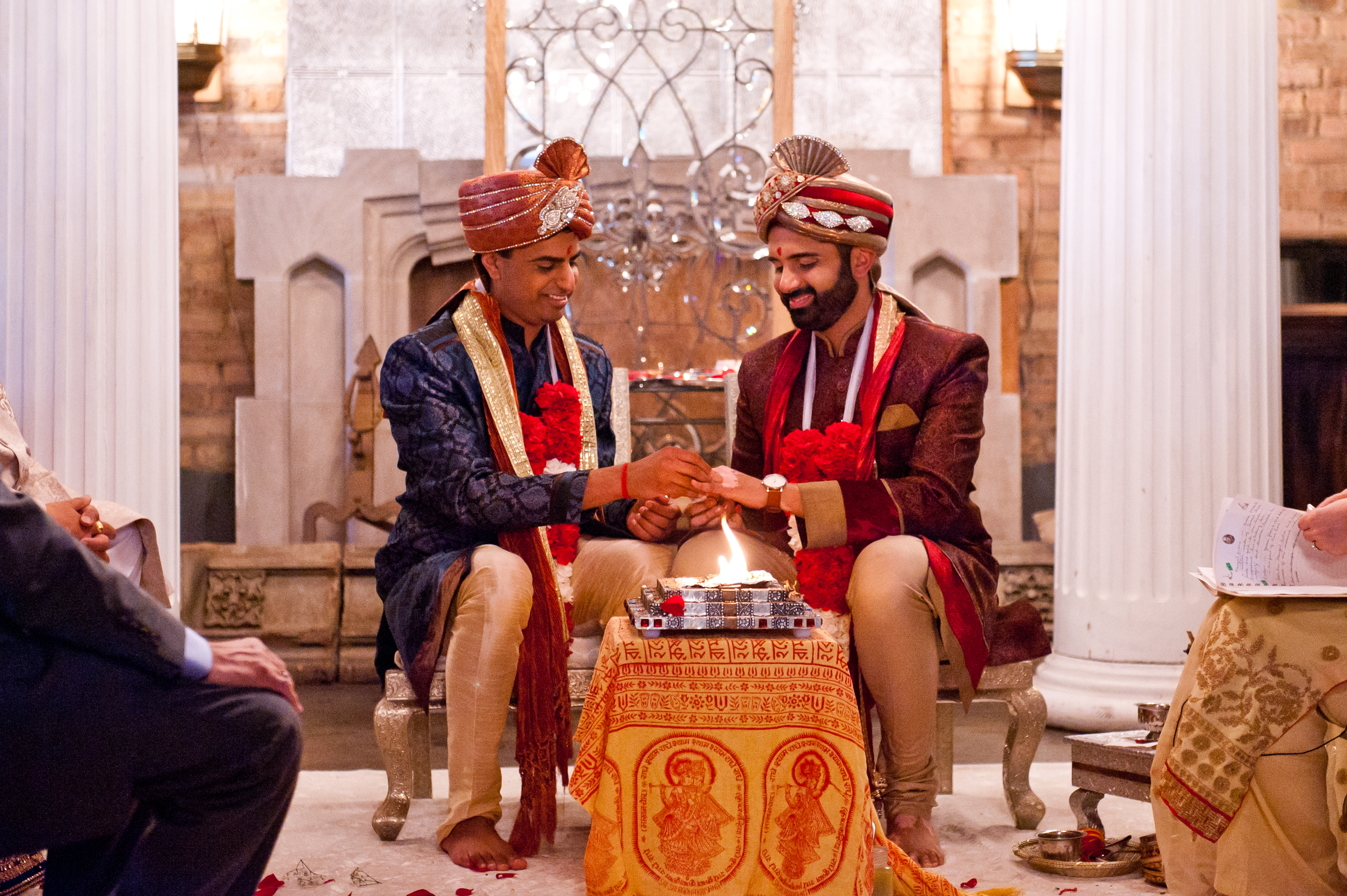
[dropcap]L[/dropcap]ike a fragrant, rich over-ripe Alphonso mango, the union of Anu and Neeral has all the ‘rasa’ – the juice of the culture of the Indian sub-continent, the exuberance of a big fat Indian wedding. It’s a joyous story of parents, siblings, extended families and friends all coming together for a delirious celebration, the union of a same sex couple in the open and with the beating of noisy, happy drums.
After the devastating grief of Orlando, why not celebrate this small victory, this affirmation of how our world is changing – one couple, one family at a time?
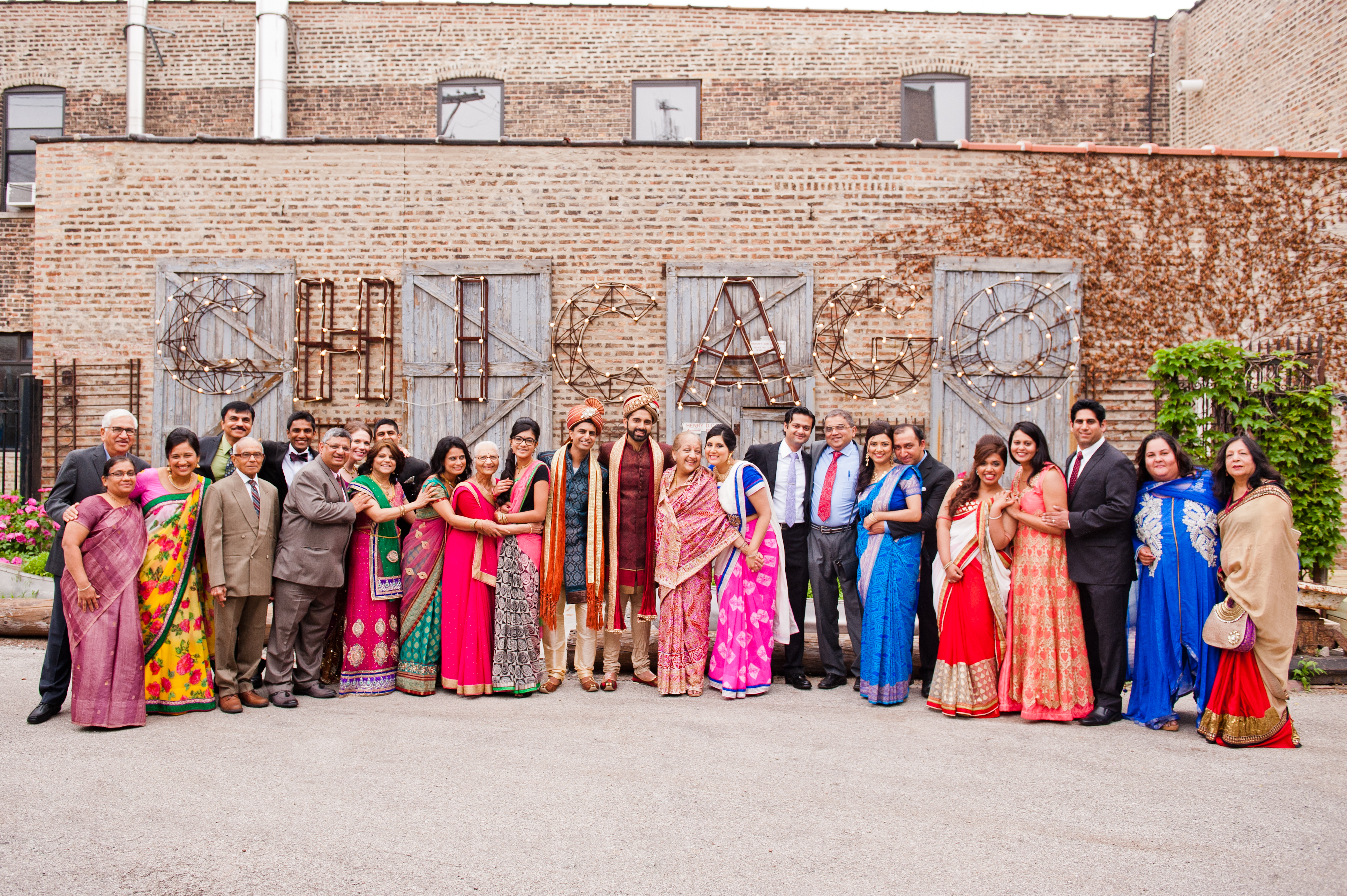
[dropcap]P[/dropcap]erhaps their story and that of others like them in the US like will help change things in India. After all, we all – gay and straight, male and female, of all colors and class – have but one life to live and should relish it and live it to the fullest.
As the wise old sages of Bollywood have proclaimed, “Zindagi Na Millegi Dobara”….
So with love for all those we lost at Orlando, for all the private hurts and griefs so many have gone through and for all those still struggling to come out and find their rightful place in society – we give you – Neeral and Anu! Our very own Gay Pride Parade!
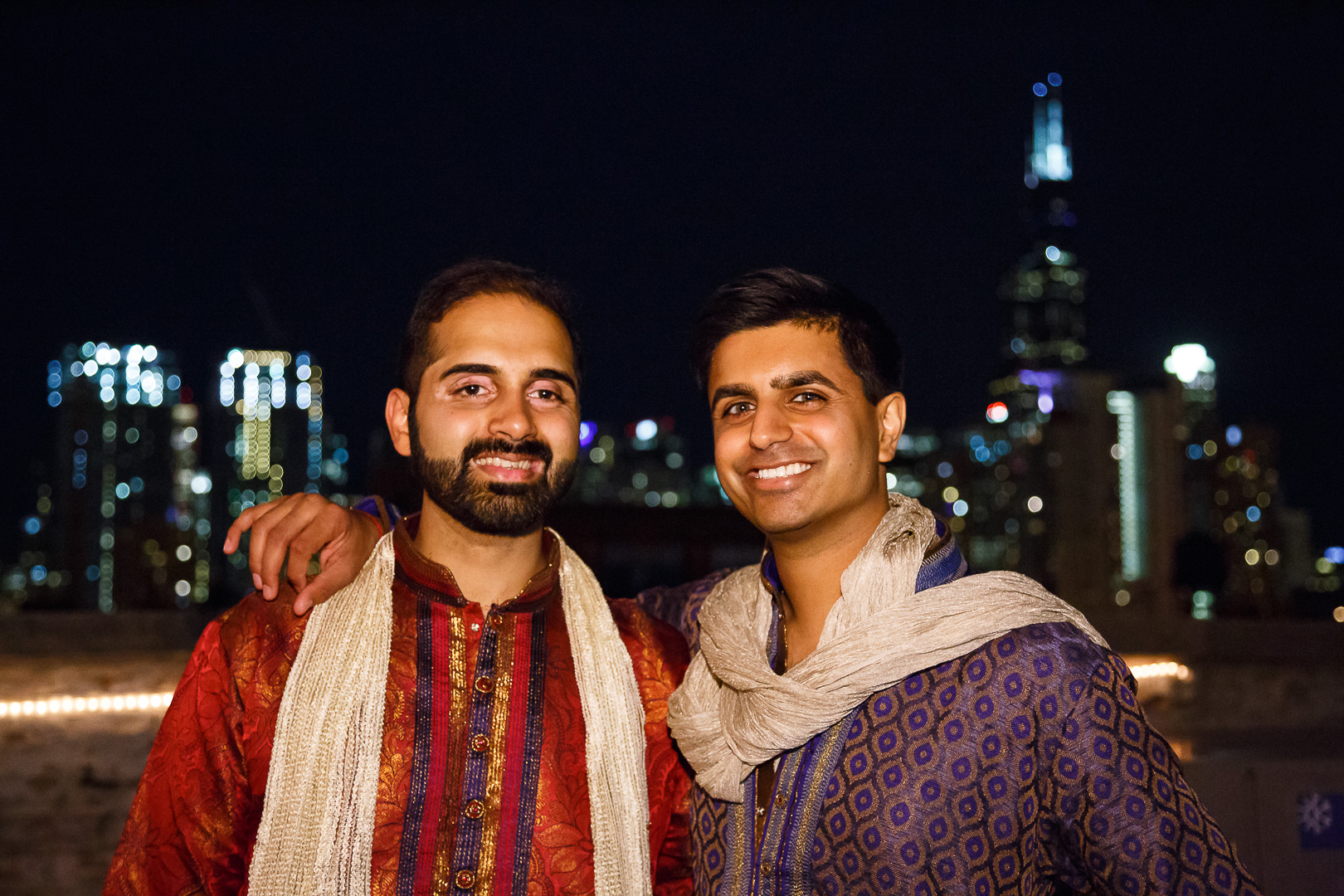
Anu and Neeral on Orlando
The tragedy at Orlando, coming so soon after a day of great happiness for you, must have had a strong impact on you both and on your friends. What have your thoughts been on it?
Processing the tragedy in Orlando has been challenging. It was a sobering reality on Sunday morning that the victims could have easily been either of us or our close friends. We vividly remember the first gay clubs we went to in our early 20s and the freedom which came from just being ourselves without judgment of the outside world. To have this safe space so brutally taken away from so many men and women of our community is heartbreaking. The juxtaposition of these events directly after our celebration with family, friends, and the south Asian community made it all the more jarring. There have been countless thoughtful posts and articles by our friends that we have been sifting through in recent days. We have found some peace in these discussions and acts of solidarity.
Yet, in spite of this tragedy, there is no way but to move on and to celebrate life. What do you think are some of the ways that gay and straight, Muslim and non-Muslim, male and female can come together to make our world a more civil and humane place?
Anu: We must continue to celebrate life and love as they are the greatest gifts we have. We are in no position to dole out advice on how to achieve world peace. But we are adamant believers on the search for common ground.
Neeral: For me it’s incredibly important to be open towards people that have different experiences and views from myself. It’s easy for anyone to dehumanize a group of people if they believe they have nothing in common with them, but it’s much harder when personal stories and moments are shared. Without connecting with people on an individual level, we are forced to make judgments about others that are based on stereotypes.
At our wedding we had such a diverse group of guests come together to celebrate us. I think there are some people out there that would be surprised to hear the number of different ethnicities, faiths (Hindu, Jewish, Muslim, Buddhist, Christian, Atheist), and ages (from 8 months old to 80 years old) present for our wedding.
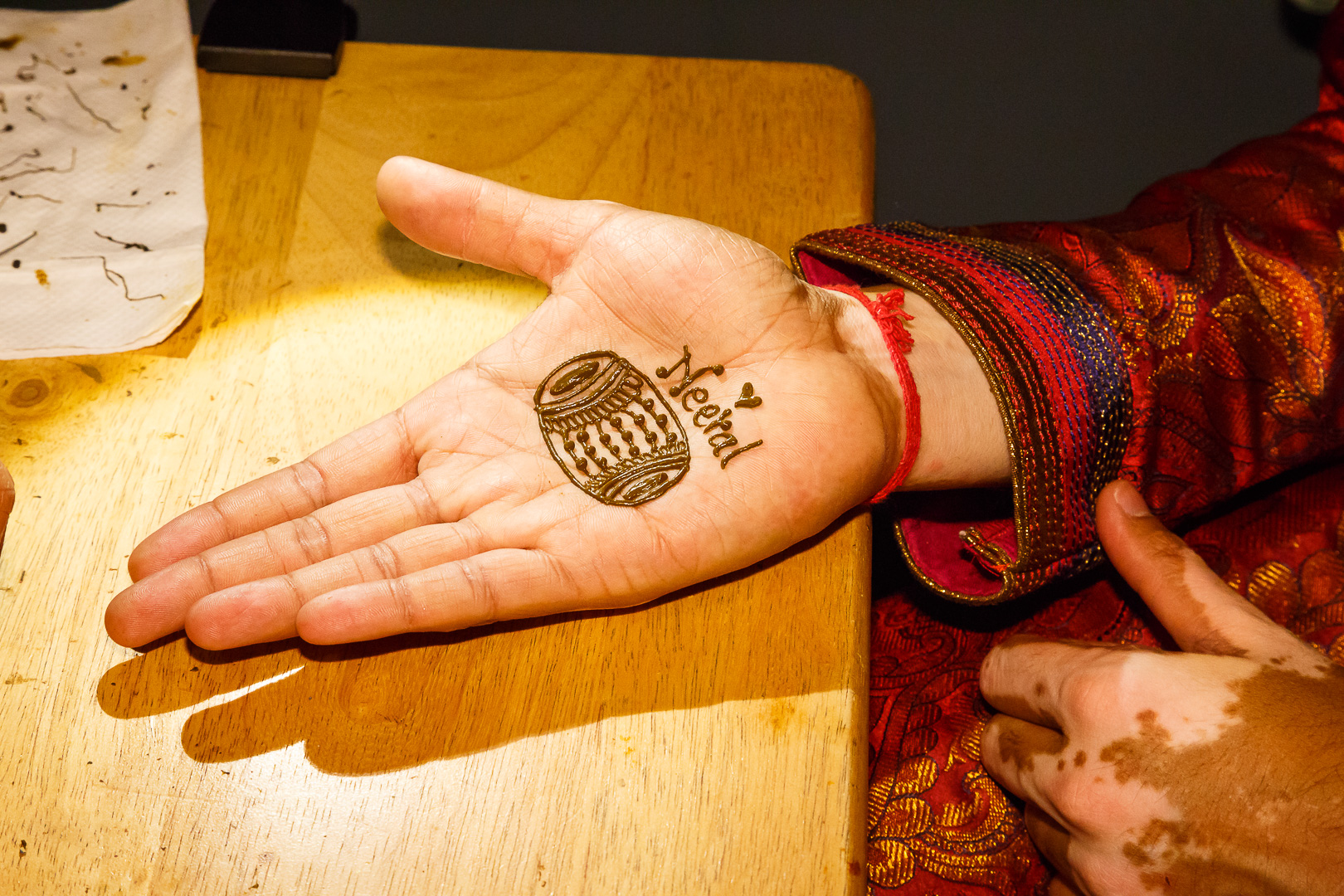
by Alejandro Mallado Erbez
Childhood Stories from Neeral and Anu
When did you first realize you were gay – was childhood tough or easy – any anecdotes you can recall?
Anu: I first knew I was gay pretty young, probably at age 5. I just remember being attracted to males on television more than females. It was difficult for me to unpack more than that but I knew there was something wrong and I should keep it to myself. It’s hard to say if this was “tough or easy” as I don’t really have anything else to compare it to. I just knew I was different than my friends but had no idea why or what to do. There really isn’t any word for “gay” in the Bengali dictionary and my family (like many South Asian immigrant families) never broached the topic of sexuality. I can’t remember the exact age when I finally learned what the word “gay” meant but I remember feeling some sense of relief that I wasn’t the only one out there.
Neeral: I remember feeling “different” when I was around 6 but at that time I didn’t know exactly what it was that made me feel that way. Around age 12 is when I finally understood what was going on with me, and that made me feel ashamed, angry (at myself and at God), and disgusted with who I was. I did not want to be gay and I questioned whether my life was even worth living. I was teased in school and really did hate my life. I have no idea what kept me going but around age 15 I started to open up to my friends about my sexuality. Thank God most of them were accepting of me- I don’t know what I would have done had my friends rejected me.
How and when did your families come to the US and what were they involved with?
Both our parents came to the US in the late 70s and early 80s. Anu’s parents came to the country to complete their higher education and Neeral’s father immigrated to the US as a trained pharmacist. Both our parents were drawn to America for the wealth of opportunities and ended up spending the rest of their lives in this country for that very reason.

Ek Love Story….
How did you meet each other?
We were introduced by a mutual friend on an online networking website in 2005. After talking on and off for about a year, we finally met in Chicago during the Summer of 2006. Was it love at first sight? It depends who you ask. But when it was time for Anu to head back to Boston, the two of us knew this was something special, so we decided to give long distance a try.
When did you decide to make a serious commitment to each other?
While neither of us had been in long term serious relationships before, we both knew the connection we had was significant. We decided to just go with it and make that serious commitment from that initial meeting.
Was it hard telling people – friends and especially family?
By the time we starting dating, we were already completely open about our sexualities to our friends. It was a lot of fun meeting each others close friends and building these really strong friendships which have also endured with our relationship.
Neeral had already come out to his parents while he was in high school, but Anu hadn’t at the time we started dating. When Neeral came out to his parents there was understandably some confusion, anger, and tears from his parents. It was difficult for the parents to grasp what it meant to be gay, and they were not sure whether this was something that could be changed or not, which led to Neeral being sent for therapy. Still they supported him, however the topic of being gay was mostly avoided in hopes that Neeral would eventually change and that it was just a phase.
We first met each other’s parents as “friends” but it become really important for Anu to properly introduce Neeral as his boyfriend so he actually came out to his parents shortly after. We aren’t exactly sure what our parents made of our relationship this early on. We imagine, at the very least, bringing home another South Asian made this relationship feel less foreign to them. But to their credit, our parents accepted us with open arms and treated us like their sons. I think they were both really happy to know that we weren’t alone and that we were getting support from one another.
Our parents become very comfortable after a while and slowly let their close family know of us as well. It was our engagement which finally pushed our parents to “come out” to the larger community. This, of course, took some time but we are so incredibly proud of them for not shying away and celebrating this amazing time with us and our family.
Love in India. Impossible?
You must be happy you are in the US and not India – as it would have got a very different reaction there.
Anu: I sometimes do wonder what would have happened if I was raised in India. Would I have been able to fully explore my sexuality? Would I somehow suppress my feelings and marry a woman? Or would I become more of an activist fighting against issues like IPC 377 because it would affect me so directly? It’s difficult for me to think what my life would be like in that sort of parallel universe.
But as for reactions in India, I’m not sure there is just a single narrative. While people in the US may expect or assume the reaction in India would be negative, in reality, my family in India (and elsewhere) has been amazingly supportive — from my grandmother down to my cousins. Both Neeral and I had family members fly to the US just for our wedding. We were overwhelmed with this outpouring of love and support, it was something we truly did not expect. I understand this is not universal, but in the course of our 10 year relationship, we have seen policies and people change.
Neeral: There were definitely more resources available to me here in the US while growing up, and that really helped me to become proud of myself, stop hating myself, and find friends that I could connect with. If I had grown up in India I think it would have been much harder to do, especially 10-15 years ago, before the age of smartphones and dating apps. I imagine that if Anu and I had held a wedding celebration in India then we probably would have tried to keep it more private to avoid any conflicts. In the US, we had so many people excited about our union that we were really encouraged to share it with as many people as possible.

Popping the Question
When and how did you decide to get married? Were there any religious issues?
Anu: After nearly nine years of dating, I finally decided to pop the question. On Neeral’s 30th birthday, I cooked the first meal we ever made together (enchiladas, very classy). I wrote him a very long birthday card essentially stating how proud of him I was for everything he had accomplished. My message concluded with “maybe there is one last thing you can achieve before this decade ends and maybe Milo [our cat] can help…” Neeral turned around to see me on one knee holding Milo who was now wearing a white gold ring around his collar. Before Neeral could process what was going on, Milo immediately scampered away (ring in tow). After several minutes of coaxing Milo from under our bed, Neeral was finally able to say “Yes” and accepted the ring. Our close friends were in on the surprise and had organized a little party at our favorite karaoke bar and we celebrated the night away. The following Valentine’s Day, Neeral even surprised me with an engagement ring of my own.
Neeral: Anu decided to propose to me on my 30th birthday. He had told my parents and my friends about his plans, and he surprised me with an engagement ring. After we got engaged we started our search for someone who would be able to perform a Hindu ceremony. Luckily some friends directed us to Hersh Khetarpal who we felt incredibly comfortable with right from the start. We did inquire about having our ceremony at one of our favorite temples, however we were unfortunately turned away.
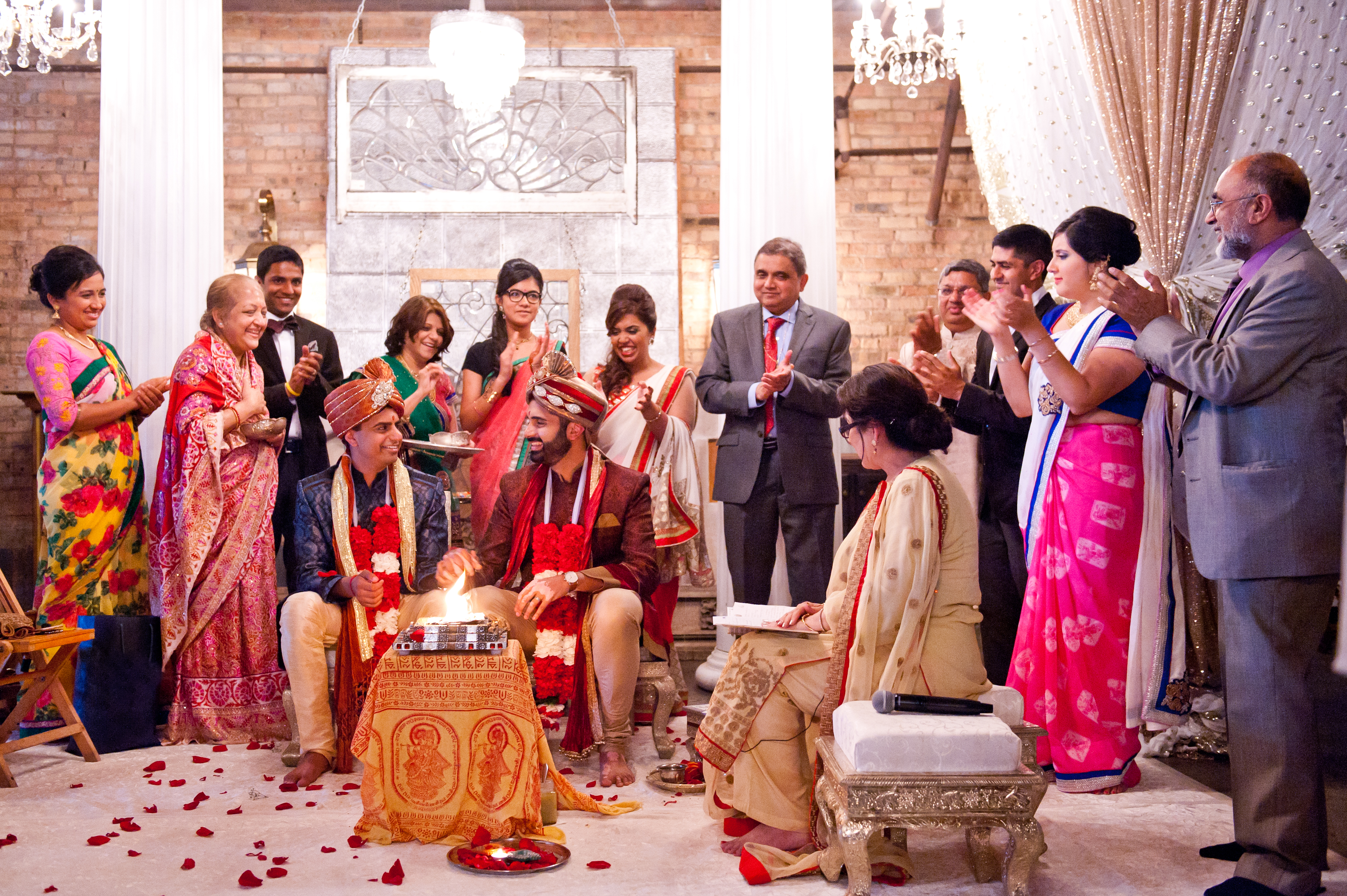
The Big Fat Indian Wedding!
Tell me about the big day, what you wore, what you did. Neeral you are Gujarati and Anu you are Bengali. Any fun facts, anecdotes or strange but true things of traditional Indian weddings which you incorporated into your wedding.
It was really important to us our wedding have Hindu elements as well as incorporate our cultures. Neeral is Gujarati and Anu is Bengali but we were clearly in uncharted territory on how to make all this work with two men getting married.
Our parents organized a graha shanti puja the day before the wedding with a fully catered Gujarati lunch. That evening we held a sangeet and garba which was a lot of fun! There were henna artists there to let everyone (men and women) get mendhi. Some of our friends gave touching speeches and performed awesome dance routines. Neeral’s young 13-year-old cousin also performed a traditional kathak piece. We gave out dandiyas from India as presents to our guests and the night went on with garba, then raas, then open dancing.
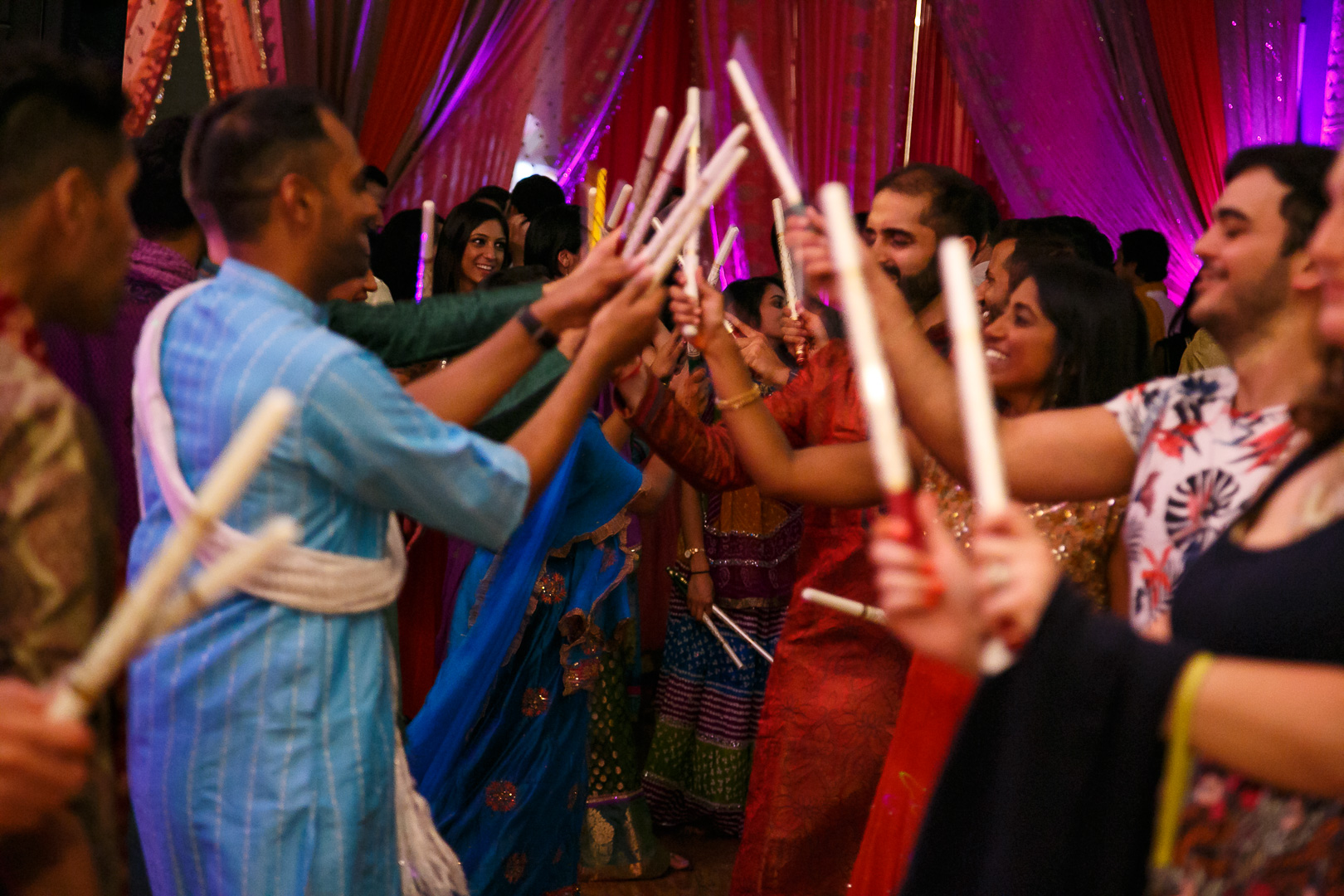
The next day was the big event. As our wedding was held in an event space that also served as an antique store, we decided to try to make our theme “vintage India.” We wore traditional indian sherwanis for the wedding ceremony followed by tuxedo suits for the reception. We had a bridal party full of our closest friends and relatives and we tried to style the girls’ hair and makeup after Sharmila Tagore from the 60s. Probably the most meaningful aspect of the ceremony was seeing almost everyone we cared about in one room. We walked in to a sitar version of Beyonce’s song “Halo”. Our guests, knowing how groundbreaking this was for us, clapped emphatically as we reached the mandap.
Hersh Khetarpal, our officiate, explained the traditional Vedic vows in English for all of our guests, and explained how her own journey led to performing same-sex Hindu wedding ceremonies. The ceremony was a mix of prayer and laughter and there were a lot of moments that we will remember forever. After the ceremony was over, it felt so cool to walk down the aisle as a married couple and be showered by rose petals.
After the ceremony was the reception. Before dinner was served, Anu’s sister gave a heartwarming speech acknowledging how proud of all of us and our parents she was. Neeral’s brother gave a speech describing Anu as another older brother and taking a few playful jabs of humor at Neeral’s expense. Neeral’s mama and mami also gave a touching speech, again welcoming Anu to the family.
Being Bengali, sweets are really important for Anu’s family. Anu’s mom made her own rossgullas and chom-choms which were served as dessert with the wedding cake. After dinner, Neeral and Anu had their first dance which was then followed by a mother-son dance (to the song Jab Koi Baat Bigad which Neeral’s mom had chosen). The dance floor was then open to everyone to party the night away (and we did!)
Jab Koi Baat Bigad Jaye – A Love Song
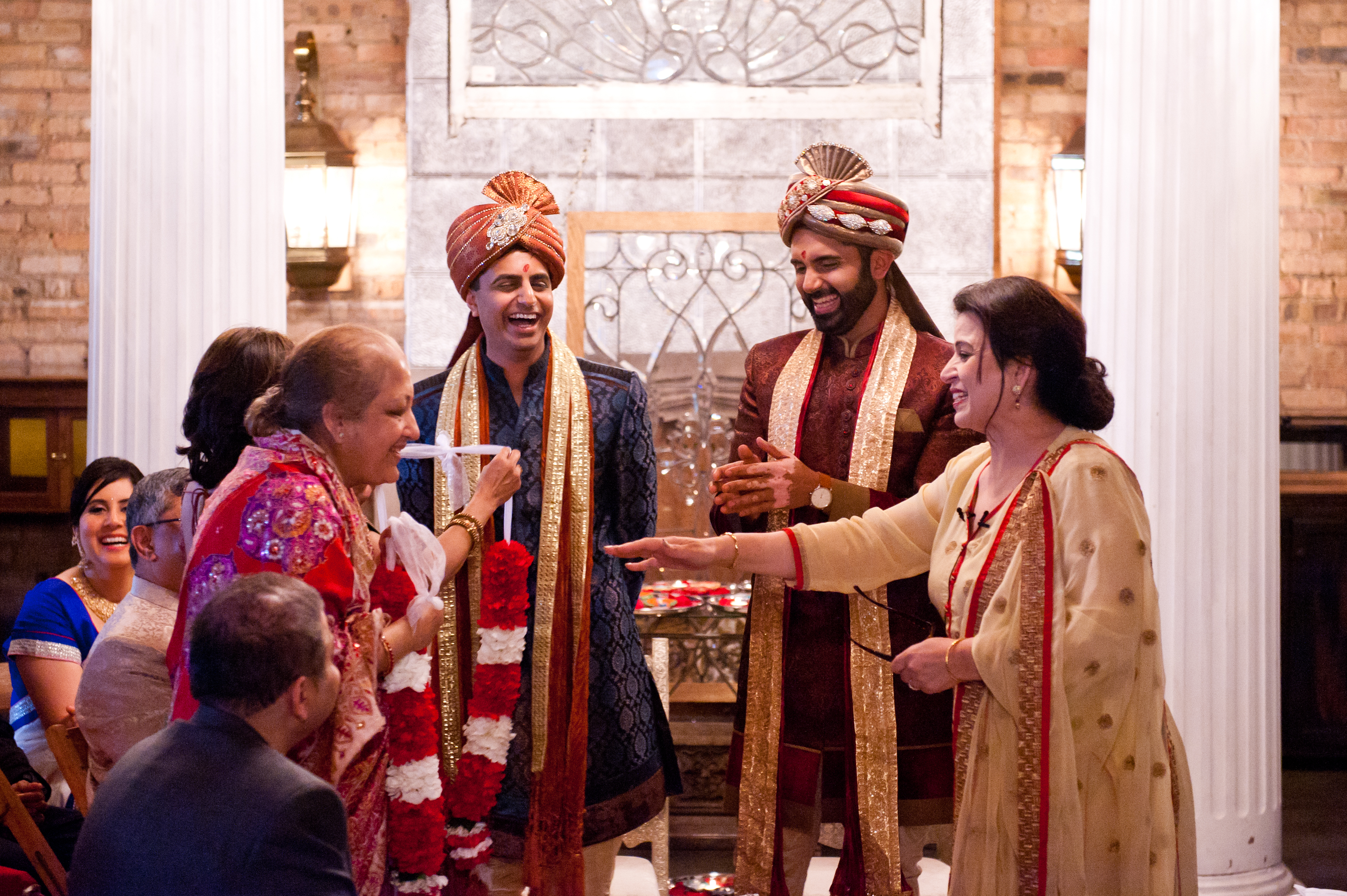
The Priestess who performed the Ceremony
Tell me about the officiate who performed the ceremony? Usually it’s hard to get someone to perform Vedic Hindu marriage ceremonies for same sex couples but your officiate seems to be on a mission. Tell me about other weddings she may have done and if she’s able to do them in other parts of the US.
Hersh Khetarpal, or Hersh Auntie as we call her, is amazing. She is the Acharya (Director) of Yod Sadhan Ashram in Chicago. She has her own moving story that brought her to become a same-sex wedding Hindu officiate (and she does heterosexual weddings too!). She has performed a handful of our friends’ marriages and always brings a sense of calm and love to everything she touches. She encouraged our parents to be more open about our relationship and helped counsel them on how to handle any rejection they may encounter from relatives, friends, or the greater community. We do believe she is available to do such weddings in other parts of the US. Her website can be reached by going to the following link: http://yogsadhanashram-usa.org/
How are Same-Sex Marriages Different?
What is same sex marriage like with two husbands? Who plays the wife – who makes the coffee, the beds and dinner? I hope this is not being intrusive but I’m sure straight couples are curious about this!
Really, we see no difference between our relationship and that of our straight friends. We have certain roles that we enjoy (for example Anu likes to cook and Neeral like to do the laundry) and we compromise on the roles that neither of us particularly enjoy (such as cleaning the apartment). Neither one of us really takes on the traditional “wife” or “husband” role, but this is also the case with most of our heterosexual friends. It has become much more commonplace (at least in our circle of friends) for women have full-time jobs that are just as demanding as their husbands’ jobs. We’ve noticed that each individual couple (straight or gay) has their own unique balance with how they share the household duties.
Can hetro-couples learn something from same sex couples? Are there special qualities that you bring to the union.
It is difficult to generalize all same-sex couples and all heterosexual couples but there are differences that could ring true for some.
One aspect that could be considered a benefit is that we came into the relationship as true equals. Sometimes this may not be the case in traditional marriages where the husband is expected to lead and the wife expected to follow.
Another aspect is that we have had to face stigma and discrimination throughout the process of becoming open about our individual sexualities and also when presenting ourselves as a same-sex couple. That challenge really did bring us closer together as a couple and made us quickly recognize how important the relationship was to us. After overcoming these challenges I think we are less likely to take the relationship for granted.

Wedding Aftermath
Would you feel comfortable visiting India and what do your immediate family think about it?
Yes, we feel very comfortable visiting India. We were just there last year for Anu’s sister’s marriage. Anu’s family was aware of our relationship and they were extremely open and welcoming to me despite the language barrier. Most of Neeral’s family in India became aware of his sexuality and relationship with Anu within the past couple of months. Neeral has received numerous Whatsapp and Facebook messages from them telling him how proud they are and congratulating us. Despite the political views on homosexuality in India, our families have been extremely supportive of us and we are lucky to have them. We suspect that there are many people in India that would also be supportive if given the chance.
Your advice to gays who may be still hesitating to come out or make a commitment to a partner?
Coming out is such a personal decision and we empathize with anyone in the closet trying to make that choice. Both our decisions to come out were heavily weighed by family expectations and obligations. But honestly, as our parents and families were given time and space to process everything, they became our strongest allies.
As far as making a commitment to a partner, we believe that a partner should be one’s “best friend” and someone you can truly see enjoying life with and growing old together. Don’t get us wrong, the past 10 years haven’t been a breeze. In our relationship there is excitement, adventure, tears, anger, compromise, teamwork, friendship, and love. We have had to constantly work on our relationship to help nurture it and let it grow. But in the end of the day, we are partners on the same team and we wouldn’t have it any other way.
The best part of being married and being a husband and having a husband?
We’ve only been married for about 2 weeks now, but knowing that we are now entitled to the 1,138 benefits, rights, and protections that heterosexual married couples receive in the US is a major victory! Having our extended families and communities officially recognize us as legally married and being so genuinely happy for us during the wedding is a moment that both of us will always remember. Just having that memory of how so many came together to support us will give us strength in situations where we may have previously hid our relationship to avoid conflict or uneasiness.
Tell us about the honeymoon! Are exotic honeymoons and destination weddings becoming popular with gay couples? In short, are big, fat weddings in the future?
So no immediate honeymoon plans as the two of us are packing up and moving to Boston. We hope to plan a great getaway in the next year to somewhere in Greece or Spain – or both!
You both are so qualified and highly educated. I’m so glad you are open about your story because it may soften the hearts of some parents who may not be giving their gay children any space at all. You show that sexual orientation has nothing to do with a person’s ability to be successful, happy and a complete human being who is part of the larger community. Your thoughts?
We would not be where we are without the support of our friends and family. LGBTQ people are more likely to be homeless, use illicit substances, suffer from depression, and drop out of school. This is because of the rejection from society, friends, family, and so on. Sexual orientation does not inhibit people who are LGBTQ from contributing to society, it is only when placed in such rejecting and negative environments that LGBTQ people end up sacrificing their potential in order to survive.
In fact, our identities as sexual minorities has played a huge influence in the growth of our personalities and viewpoints, as well as the choosing of our professions. For Neeral, this was focusing on mental health, and for Anu it will be to ultimately work with HIV+ populations.

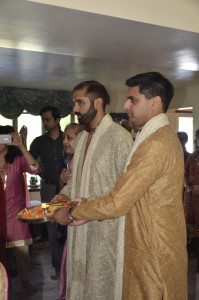
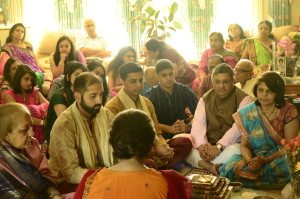
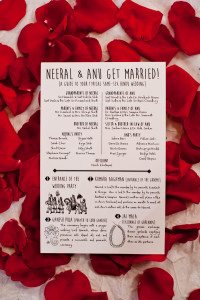
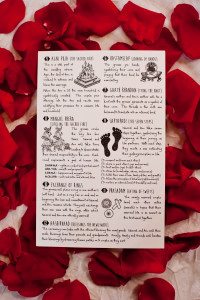
14 Comments
Pingback: | Lassi With Lavina
Via Facebook
Antoine Garth Congratulations!
Lavina S Bhojwani 👏👏👏👏👏👏👏well done!
Shago Perkins Awesome!!!! Congrats Lavina
Yasmen Mehta Shaabhash. 💕💕💕💕
Pallavi Shah Fab
Neha, agree with you, parental support can make difficult situations so much easier, and even help change the way society acts and reacts.
Ajit, I think both Neeral and Anu realize that their very supportive parents made such a wonderful family wedding possible. So much depends on the kind of parents we have – they give us life and then the kind of life depends on their approval and support to be really meaningful. I am sure the couple will go to India – already the wedding pictures have gone viral in India and surely helped change the mindset to some extent!
God bless him
Really hats off and done great job by parents
Welcome to India
I’m guessing the parents must be in their 60s. First generation Indian Americans of that age are probably a mixed lot — some enlightened enough to be supportive of gay children, others squirming within their (Indian) cultural mores. The good news for this couple was that both were blessed with parents of the former kind.
To repay this Darwinian blessing, they owe it to their Indian heritage to visit India together and socialize and proselytize their gayness in their next trip!
Thanks Amishi – it was a piece I enjoyed writing. With so much negativity around, it’s a welcome change to be reporting that the older generation isn’t always narrow-minded and family members do go out on a limb to ensure their children are happy and protected.
I loved the story, and how it evolved, and how both their parents were so supportive. I see families of straight people finding it difficult to understand and accept gays and lesbians. I can only imagine that it must mean so much to both Neeral and Aniruddh to have unconditional love and support from their friends and families. Great article as always, Lavina!
Seriously – this was meant a little tongue in cheek, playing on the traditional role society often assign to women. Of course some men make the coffee, the bed and dinner but not all do. Of course I understand there are all sorts of people and all sorts of relationships in the world.
“Who plays the wife?”
What kind of bullshit, sexist, uneducated question is that? None of them do, it’s two men. There is no wife and gay relationships aren’t trying to mimic straight ones.
If you think that only a wife in a heterosexual relationship is responsible for making coffee, the bed, and dinner, then I pity your relationships. Maybe you ought to reexamine your notion of equality within relationships- both straight and gay.
Raj, I want to make clear I’m not an activist or a leader of any sort. As a journalist I watch the world and the way it’s changing – and I just write about what’s already happening.
Reform in society means in Indian-Society or culture after this article people will support them.
We need some reforms in the society nowadays.Thanks for your leadership on right
time.
Nice article. Neeral ‘s birthday is same as Gandhi’s birthday. October 2nd. So he is 2nd Gandhi.